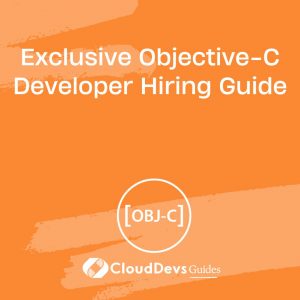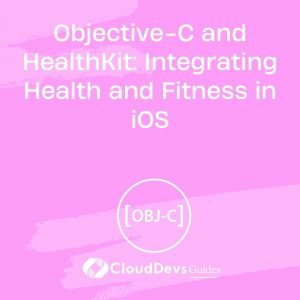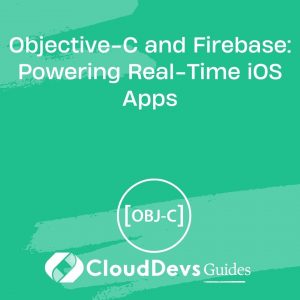Exclusive Objective-C Developer Hiring Guide
Objective-C is a powerful object oriented programming language that is used to develop a wide range of applications for iOS devices. It offers several benefits that make hiring Objective-C developers an attractive option for companies looking to build robust and secure mobile applications. Its compatibility, robust frameworks, legacy code support, large developer community, integration with the Apple ecosystem, performance advantages, and support for legacy applications makes it a programming language of choice among the development community. Objective-C has therefore emerged as a popular programming language in 2023. With its established reputation, cost savings, increased productivity, enhanced software quality, and access to a strong talent pool, Objective-C development provides companies with a solid foundation for success in the mobile market. Given the rising global demand for Objective-C, there is a growing need to hire talented Objective-C developers.
Table of Contents
1.0 Key insights on Objective-C
- Compatibility: Objective-C is compatible with both C and C++ programming languages. This compatibility allows developers to leverage existing libraries and frameworks, making it easier to integrate Objective-C code into existing projects.
- Robust Frameworks: Objective-C has a rich set of frameworks, such as Cocoa and Cocoa Touch, which provide a comprehensive set of tools and libraries for developing applications. These frameworks make it easier for developers to build sophisticated and feature-rich applications.
- Legacy Code Support: Many existing iOS and macOS applications are written in Objective-C. By using Objective-C, developers can easily maintain and extend these legacy applications, ensuring compatibility with new features and updates.
- Large Developer Community: Objective-C has been around for many years, which has led to a large and active developer community. This community provides a wealth of resources, such as tutorials, documentation, and open-source libraries, making it easier for developers to learn and solve problems.
- Apple Ecosystem: Objective-C is the primary programming language used for developing applications for Apple’s platforms, including iOS, macOS, watchOS, and tvOS. By using Objective-C, developers can take advantage of the full capabilities and features of these platforms, ensuring a seamless user experience.
- Performance: Objective-C is known for its performance, especially when compared to other higher-level languages. This performance advantage makes Objective-C a preferred choice for developing resource-intensive applications, such as games or multimedia applications.
- Legacy Support: Objective-C has a long history and is deeply rooted in the Apple ecosystem. Many existing codebases are written in Objective-C, and transitioning to a different programming language would require significant time and effort. Therefore, developers often choose to continue using Objective-C to maintain and extend these existing applications.
2.0 Key benefits companies can gain by hiring Objective-C developers
Cost and Time Savings
- Objective-C is a highly productive language, allowing developers to write code quickly and efficiently.
- This increased productivity can result in shorter development timelines, leading to cost savings for the company.
Quality and Performance
- Objective-C developers are experts in optimizing code for memory efficiency and performance, ensuring that applications run smoothly and efficiently on iOS devices.
- Objective-C provides a robust set of frameworks and libraries that developers can utilize to build applications with powerful features and functionalities.
- These frameworks and libraries help developers save time on coding and simplify complex tasks, leading to higher quality and more robust applications.
Market Expertise
- Objective-C has established itself as a leading language for developing mobile applications for the Apple ecosystem, attracting talented developers who are passionate about creating innovative and engaging experiences for Apple users.
- By working with Objective-C developers, companies can benefit from their in-depth knowledge of Apple’s design principles and guidelines. This expertise enables developers to create applications that seamlessly integrate with iOS devices and deliver a seamless user experience.
- Objective-C developers are often at the forefront of industry trends and technologies. They stay updated with the latest developments and advancements in Objective-C and iOS, ensuring that companies can build applications that are innovative and competitive.
3.0 Essential pre-planning by companies when hiring Objective-C developers
Pre-planning is a crucial stage for companies when hiring Objective-C developers. This process involves several key steps that help ensure a successful recruitment and project execution. The following is a detailed list of pre-planning activities that companies should undertake:
Defining Project Scope and Requirements:
- Clearly define the project’s objectives, including the desired outcome and deliverables.
- Identify the specific functionalities and features that the Objective-C developer will be responsible for.
- Determine the project timeline and any specific deadlines that need to be met.
Identifying Development Requirements:
- Assess the technical skills and expertise required for the project.
- Determine the specific version of Objective-C and any additional frameworks or libraries that the developer needs to be proficient in.
- Identify any integrations or APIs that the developer should be familiar with.
Evaluating Project Risks and Budget:
- Conduct a comprehensive risk assessment to identify potential challenges and obstacles that may arise during the project.
- Estimate the budget required for hiring an Objective-C developer, considering factors such as salaries, benefits, and any additional expenses.
- Allocate resources for potential contingencies and unforeseen circumstances.
Assessing Candidate’s Prior Portfolio of Work:
- Review the candidate’s prior experience and portfolio of Objective-C projects.
- Evaluate the quality and complexity of the candidate’s previous work to determine their level of expertise.
- Look for projects that align with the scope and requirements of your own project.
By following these pre-planning steps, companies can streamline the hiring process and ensure that they find the most suitable Objective-C developer for their project. This comprehensive approach helps define project expectations, mitigate risks, and assess the candidate’s qualifications effectively.
4.0 Roles and Responsibilities of Objective-C developers
- Developing and maintaining iOS applications: Objective-C developers play a crucial role in developing and maintaining iOS applications. They are responsible for writing clean, efficient, and reusable code using Objective-C programming language. They ensure that the applications are compatible with different iOS versions and devices.
- Collaborating with cross-functional teams: Objective-C developers work closely with cross-functional teams, including designers, product managers, and QA engineers. They collaborate to understand the application requirements, discuss implementation strategies, and ensure seamless integration of features.
- Implementing user interface designs: Objective-C developers are responsible for implementing user interface designs in iOS applications. They work closely with designers to translate design mockups into working code. They ensure that the user interface is visually appealing, intuitive, and responsive.
- Debugging and troubleshooting: Objective-C developers are skilled in debugging and troubleshooting iOS applications. They identify and fix software defects, performance issues, and compatibility problems. They use debugging tools and techniques to analyze and resolve issues in the codebase.
- Optimizing application performance: Objective-C developers optimize the performance of iOS applications by analyzing and improving code efficiency. They identify bottlenecks and implement optimization techniques to enhance the application’s speed, memory utilization, and battery life.
- Maintaining code quality and documentation: Objective-C developers follow coding best practices and coding conventions to maintain code quality. They write clean, modular, and well-documented code that is easy to understand and maintain. They also maintain documentation related to the application’s architecture, design patterns, and implementation details.
- Keeping up with industry trends and best practices: Objective-C developers stay updated with the latest industry trends, best practices, and emerging technologies related to iOS development. They continuously enhance their knowledge and skills to deliver high-quality applications that meet the evolving needs of users.
- Conducting code reviews: Objective-C developers participate in code reviews to ensure the quality and consistency of the codebase. They provide constructive feedback to their peers and collaborate to identify and resolve code-related issues.
- Testing and Quality Assurance: Objective-C developers work closely with QA engineers to test and ensure the quality of iOS applications. They participate in unit testing, integration testing, and user acceptance testing. They also collaborate to reproduce and fix reported bugs.
- Continuous improvement and learning: Objective-C developers have a growth mindset and actively seek opportunities to learn and improve. They attend conferences, workshops, and training sessions to enhance their skills and stay updated with the latest advancements in Objective-C and iOS development.
5.0 Objective-C developer tools and libraries
To aid developers in their Objective-C projects, there are several tools and libraries available that can greatly enhance the development process. In this section, we will explore some of the essential Objective-C developer tools and libraries.
Xcode: Developed by Apple, Xcode provides a comprehensive set of tools for building, testing, and debugging Objective-C applications. It comes bundled with the iOS and macOS software development kits (SDKs) and includes features like code completion, syntax highlighting, and interface builder for creating user interfaces.
CocoaPods: This is a dependency manager for Objective-C projects that simplifies the process of including third-party libraries into your codebase. With CocoaPods, you can easily search for and integrate libraries that provide additional functionality, such as networking, database management, or user interface components. It also handles library versioning and updates, making it easier to keep your project up to date.
LLDB: This is a powerful debugger that allows developers to step through their code, set breakpoints, inspect variables, and analyze memory usage. Integrated with Xcode, LLDB provides a user-friendly interface for debugging Objective-C applications, making it easier to identify and fix issues.
XCTest: This allows developers to write test cases to verify the functionality of their code and catch any regressions or bugs. It integrates seamlessly with Xcode, making it easy to run tests, view test results, and track code coverage.
AFNetworking: This is a widely-used library for making network requests, handling JSON parsing, and managing network dependencies. Another popular library is MagicalRecord, which simplifies working with Core Data, Apple’s object-relational mapping framework.
These are just a few examples of the many tools and libraries available to Objective-C developers. Whether a beginner or an experienced developer, utilizing these tools and libraries can greatly improve productivity and support developers build robust and efficient Objective-C applications.
6.0 Assessing candidates to land the best-fit Objective-C developer for your project
Assessing potential candidates when hiring Objective-C developers involves evaluating their technical skills, soft skills, and fit with company culture. Here is a list of criteria to consider during the assessment process:
6.1 Technical Skills:
- Objective-C Proficiency: Assess the candidate’s expertise in Objective-C programming language, including knowledge of syntax, data structures, memory management, and object-oriented programming concepts.
- iOS Development Experience: Evaluate the candidate’s experience in developing iOS applications using Objective-C, including familiarity with UIKit, Core Data, and other relevant frameworks.
- Debugging and Problem-Solving: Determine the candidate’s ability to identify and resolve technical Debugging and Problem-Solving issues, debug code, and optimize performance.
6.2 Soft Skills:
- Communication: Assess the candidate’s ability to effectively communicate and collaborate with team members, stakeholders, and clients.
- Teamwork: Evaluate the candidate’s capacity to work in a team environment, contribute to collective goals, and share knowledge with colleagues.
- Time Management: Determine the candidate’s organizational skills, ability to prioritize tasks, and meet project deadlines.
- Adaptability: Assess the candidate’s flexibility and willingness to learn and adapt to new technologies, frameworks, and programming paradigms.
6.3 Fit with Company Culture:
- Values Alignment: Assess the candidate’s alignment with the company’s values, mission, and vision. Evaluate if they can contribute positively to the existing work culture.
- Work Ethics: Determine the candidate’s professional conduct, integrity, and commitment to quality work.
- Cultural Fit: Evaluate whether the candidate’s work style, communication approach, and problem-solving methods align with the company’s culture.
By considering these criteria, you can effectively assess potential candidates when hiring Objective-C developers, ensuring you find individuals who have the necessary technical expertise, soft skills, and fit with your company culture.
7.0 Platforms to access potential Objective-C developer candidates
Online Recruitment Platforms:
- LinkedIn: A professional networking platform where you can search for Objective-C developers based on their skills, experience, and location.
- Indeed: An online job board that allows employers to post job openings and search for Objective-C developers who are actively seeking employment.
- Glassdoor: A platform that provides company reviews, salary information, and job listings, making it easier to find Objective-C developers.
Freelance Platforms:
- Upwork: A global freelancing platform where you can hire Objective-C developers for short-term projects or ongoing work.
- Freelancer: An online marketplace that connects employers with freelance Objective-C developers, allowing them to browse portfolios and hire talent.
Conferences and Hackathons:
- WWDC (Worldwide Developers Conference): Apple’s annual conference where developers gather to learn about the latest updates in Objective-C and other Apple technologies. It’s a great place to meet and network with Objective-C developers.
- iOSDevUK: A conference focused on iOS development where Objective-C developers come together to share knowledge and insights.
- Hackathons: Participating in hackathons, especially those focused on iOS development, can help you connect with talented Objective-C developers who are passionate about creating innovative solutions.
These platforms offer various avenues to access potential Objective-C developer candidates, whether you’re looking for full-time employees, freelancers, or networking opportunities. Utilizing these resources can help you connect with qualified Objective-C developers and build a strong development team.
8.0 Hourly average rates of Objective-C developers
The hourly average rates of Objective-C developers are influenced by several factors, including geographic location, demand for Objective-C developers, level of experience, and whether hiring remote or committed on-site developers.
Geographic location plays a significant role in determining the hourly rates of Objective-C developers, as summarized below. In regions with a high cost of living, such as major cities or tech hubs, the rates tend to be higher. For example, Objective-C developers working in developed regions may command higher rates compared to those working in smaller towns or rural areas.
| Region | Hourly rate to hire Objective-C developer (average) |
|---|---|
| North America | $150 |
| South America | $95 |
| Eastern Europe | $100 |
| Western Europe | $110 |
| Middle East | $100 |
| Africa | $130 |
| Asia Pacific | $90 |
| Australia | $100 |
The demand for Objective-C developers also affects their hourly rates. When there is a high demand for Objective-C developers and a limited supply, the rates tend to increase. This is often seen in industries or sectors where Objective-C is widely used, such as mobile app development or software development companies specializing in iOS applications.
The level of experience of Objective-C developers is another important factor in determining their hourly rates. Developers with more years of experience and a proven track record of delivering quality work are likely to charge higher rates compared to those who are just starting their careers. Clients are often willing to pay a premium for developers who have extensive knowledge and expertise in Objective-C.
Additionally, the choice of hiring remote or committed on-site developers can also impact the hourly rates. Hiring remote developers may offer cost savings, as they typically have lower overhead costs compared to on-site developers. As a result, their hourly rates may be lower. On the other hand, hiring committed on-site developers may require additional expenses such as office space and equipment, which can lead to higher hourly rates.
As your reliable partner for sourcing tech talent, CloudDevs is here to support you landing expert Objective-C developers for your project. The above hiring process could significantly consume you time, efforts and is also not free from errors.
CloudDevs offers you seamless Objective-C developer hiring experiences. Reach out now to hire a highly-vetted Objective-C developer!
Table of Contents









